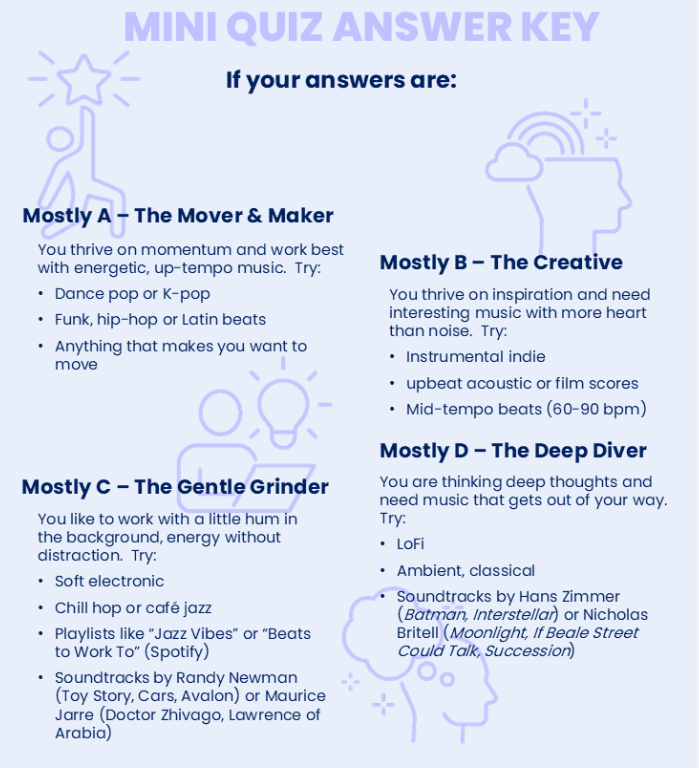
Music, Mood, and Getting Stuff Done
Believe it or not, using music to heal the mind, body, and spirit dates back to the Upper Paleolithic period, about 20,000 years ago. It’s possible the music back then sounded like a three-year-old with a drum set. But music has been getting and keeping people on track across millennia.
During the past two years, more than 8,000 papers have been published in peer-reviewed journals on the topic of music’s ability to heal mind and body. And today, there are actual procedure codes (which allow medical providers to get paid by insurance companies) for the use of music in hospital, clinical, and outpatient settings.
But can music make us happier and help us get more done at work? Absolutely!!
Music and Productivity
Scientists have been looking at how music affects productivity for more than seventy years. And virtually every study has demonstrated the profound impact music can have on our workday lives. Early investigations focused on the use of music in industrial settings to enhance worker efficiency. For instance, in the 1940s, Harold Burris-Meyer conducted experiments demonstrating that strategically timed music could boost factory output by up to 11%.
In the 1970s, researchers began exploring the effects of background music on repetitive tasks, finding that certain types of music could improve worker efficiency. More recently, during our more highly evolved era, studies have examined how different uses of music, such as for emotional regulation or as background noise, impact job satisfaction and performance.
Music and Emotion: Your Built-In Mood Regulator
Music doesn’t just entertain—it biologically affects your brain. Research shows that music you enjoy triggers dopamine release, similar to eating chocolate or exercising. It also activates regions of the brain tied to emotion, memory, and reward, which is why a single song can flood you with nostalgia, calm you down, or pump you up. An experiment at McGill College found that listening to music activates the same brain structures and regions linked to other euphoric stimuli, such as food, sex, and drugs. Blood rises and falls with the swells of music in areas of the brain associated with reward, emotion, and arousal. In addition, music activates the motor cortex, the part of the brain that controls voluntary movements.
In a 2023 workplace study, researchers found that using music specifically for emotional regulation (rather than just as background noise) was tied to greater job satisfaction and perceived performance. People who used music to manage stress or shift mood at work felt more focused and effective—especially when they got to choose the playlist themselves.
Music appears to be such a good mood lifter that it has changed the way businesses operate:
- 77% of small- and medium-sized business owners believe that playing music increases employee morale. In certain industries, such as retail and hospitality, music has an even greater impact on employee performance and attitude. Happy employees provide better customer service. An improved customer experience can lead to more revenue and word-of-mouth marketing.
- 40% of business owners believe that playing music can actually increase sales, and surveys show that without music, 25% of retailers and 33% of hospitality company executives believe they would actually lose business.
- 65% of business owners believe that music makes employees more productive. But is this true?
Productivity: It’s Not One-Size-Fits-All
The science here is clear(ish): Music affects productivity, but it depends on the task, the type of music, and the employee. Here’s what decades of research (and many recent studies) broadly suggest:
- For tasks involving language (reading, writing, editing): Music with lyrics tends to interfere with verbal processing. Silence or instrumental music is better.
- For repetitive or physical tasks (cleaning, data entry, organizing): Music—especially if it’s upbeat or familiar—can improve endurance and reduce perceived effort. This is thanks to increased arousal and positive distraction.
- For cognitively demanding work: Simple, low-tempo, non-distracting music (classical, ambient, or video game soundtracks) can enhance focus, but only if it doesn’t divide your attention.
- For stress management: Music can reduce cortisol levels, slow heart rate, and even help regulate breathing. That’s why it’s often used in clinical settings for pain and anxiety management.
Music for Boosting Productivity
Music provides a great escape in noisy office environments, and it can help you drown out distractions to keep you at the peak of productivity.
However, how do different genres of music impact productivity? Here’s what the most recent research shows:
- Ambient music improves the accuracy of data entry in 92% of people
- Dance music improves proofreading speed by 20%
- Classical music improves accuracy by 12%
- Pop music reduces mistakes by 14%
In addition, one study showed that 58% of people completed tasks more quickly when listening to pop music. Complex sounds like jazz and cross-cultural sounds like K-pop and Latin music have proven to be great at sparking creativity. Ambient sound has been shown to improve concentration.
Why Music Works (and Sometimes Doesn’t)
At the core is a principle called attentional control—your brain has a limited capacity to process stimuli. Music can either help or compete:
- When music boosts positive mood and arousal, it can sharpen focus and motivation.
- When it overloads your cognitive system (like lyrics during writing), it divides attention and slows performance.
The You Factor
Now that we’ve shown you what all the studies say about which music appears to enhance performance on which tasks, you should know that the most important factor in using music to boost productivity is you!
- Autonomy matters. People who choose their own music report better results than those listening to imposed playlists.
- Intentionality is key. Music works best when you use it deliberately, not just as background filler.
- Task-match matters. The more mentally complex the task is, the more carefully you need to select your soundtrack.
Choosing your productivity soundtrack means really thinking about what makes you more productive. Familiarity and preference are more important than classical vs. pop.
So, we’ve put together a little self-assessment quiz to help you out.


The Bottom Line
Music is one of the most accessible, customizable tools we have for shaping our mood and focus. Use it intentionally—like a secret ingredient, not background wallpaper—and it can help you feel better and do better.
How to Use Music More Intentionally
- Match the vibe to the job: Energizing music for routine tasks, calm for deep focus.
- Use headphones if you need to create personal space in a noisy environment.
- Use music to regulate emotions: Feeling scattered? Listen to calming tracks to help reset your brain.
- Know when to turn it off: If you’ve memorized the lyrics but can’t remember what you’ve been working on for the last 15 minutes, you’re probably not getting much done.
And maybe … save the thrash metal for after work.